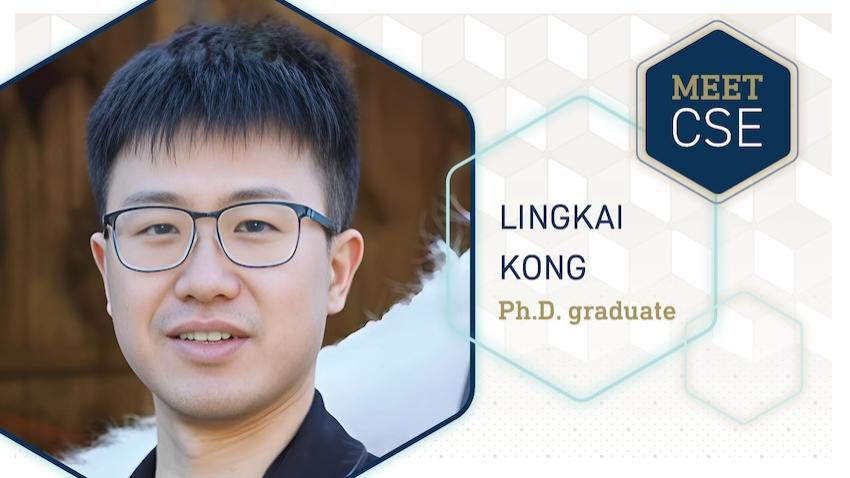
Alumnus Uses AI to Counter African Poaching, Improve Maternal Healthcare Access
For some students, the only obstacles between them and Fall 2024 Commencement are the chilly first weeks of December and final exams. Others, like Lingkai Kong, completed their degrees this past summer but officially “get out” of Georgia Tech by graduating with the fall cohort.
Since defending his dissertation in July, Kong has been working at Harvard University as a postdoctoral fellow studying under Professor Milind Tambe. Together, they develop artificial intelligence (AI) applications for public health, safety, and wildlife conservation.
We caught up with Kong to learn more about his graduate school journey, his work at Harvard, and where his Georgia Tech degree will take him next.
Alumnus: Lingkai Kong
Research Interests: Uncertainty quantification of deep neural networks; controllable generative models; aligning learning with optimization for decision-making
Education: Ph.D. in Computational Science and Engineering
Faculty Advisor: School of CSE Assistant Professor Chao Zhang
What have you been working on at Harvard under Professor Tambe?
I have been working on generative AI for social impact. One project I am currently leading involves applying diffusion models to wildlife conservation. Diffusion models enable us to simulate complex poacher behaviors previously difficult to capture with traditional methods. Using these simulated behaviors, we employ game-theoretic approaches to design robust and effective patrol strategies. The most exciting part is our collaboration with national parks in Africa, where we are actively working toward conducting field tests with our partners.
Another project focuses on using large language models to simulate maternal behavior. In this collaboration with ARMMAN, the largest mobile health organization in India, we aim to help optimize the scheduling of health workers’ resources to improve maternal and child health outcomes.
How has your CSE degree helped you most in your postdoctoral fellowship?
My CSE degree at Georgia Tech gave me a strong foundation in the latest AI techniques, such as diffusion and large language models. These cutting-edge methods have been instrumental in shaping the approaches I use in my postdoctoral research. During my Ph.D., I focused on developing general machine learning and AI methods, often tested on public benchmark datasets. Now, I can apply these methods to real-world social impact applications, bridging the gap between theory and practice.
Additionally, the interdisciplinary environment at CSE helped me recognize the importance of applying AI to other fields and collaborating with domain experts. This invaluable experience ultimately paved the way for my journey to Harvard.
What research project from Georgia Tech are you most proud of?
The project I am particularly proud of is my work on quantifying the uncertainty of deep neural networks (DNNs). DNNs can sometimes produce highly inaccurate predictions while being overly confident in their mistakes, which poses significant risks in real-world applications. Existing methods for uncertainty quantification, such as Bayesian neural networks (BNNs) and ensembles, often struggle with scalability.
To address this challenge, I developed SDE-Net—the first method to quantify DNN uncertainties from a dynamical systems perspective. SDE-Net can estimate different sources of uncertainty, is easy to implement, and is broadly applicable to both regression and classification tasks.
What advice would you give someone interested in graduate school or becoming a postdoctoral researcher?
Find what truly excites you and aligns with your values. Don’t just follow trends or what others are pursuing. For example, while AI is incredibly popular with a flood of papers on language and generative models, it’s important to think critically about how you can differentiate yourself. Focus on carving out a unique niche or perspective that helps you stand out.
What is your favorite memory from Georgia Tech?
The late nights working with my lab mates and advisor before conference deadlines are some of my favorite memories. I still vividly remember one night when my advisor stayed up with me polishing my paper until 4 a.m. before a deadline. Although it was stressful at the time, looking back, those nights—the moments of perseverance and determination—shaped who I am today and brought me to where I am now.
What are your plans after Harvard?
I am applying for faculty positions in the U.S., where I aspire to advance cutting-edge AI techniques and make meaningful contributions to society and humanity throughout my career.
As computing revolutionizes research in science and engineering disciplines and drives industry innovation, Georgia Tech leads the way, ranking as a top-tier destination for undergraduate computer science (CS) education. Read more about the college's commitment:… https://t.co/9e5udNwuuD pic.twitter.com/MZ6KU9gpF3
— Georgia Tech Computing (@gtcomputing) September 24, 2024


